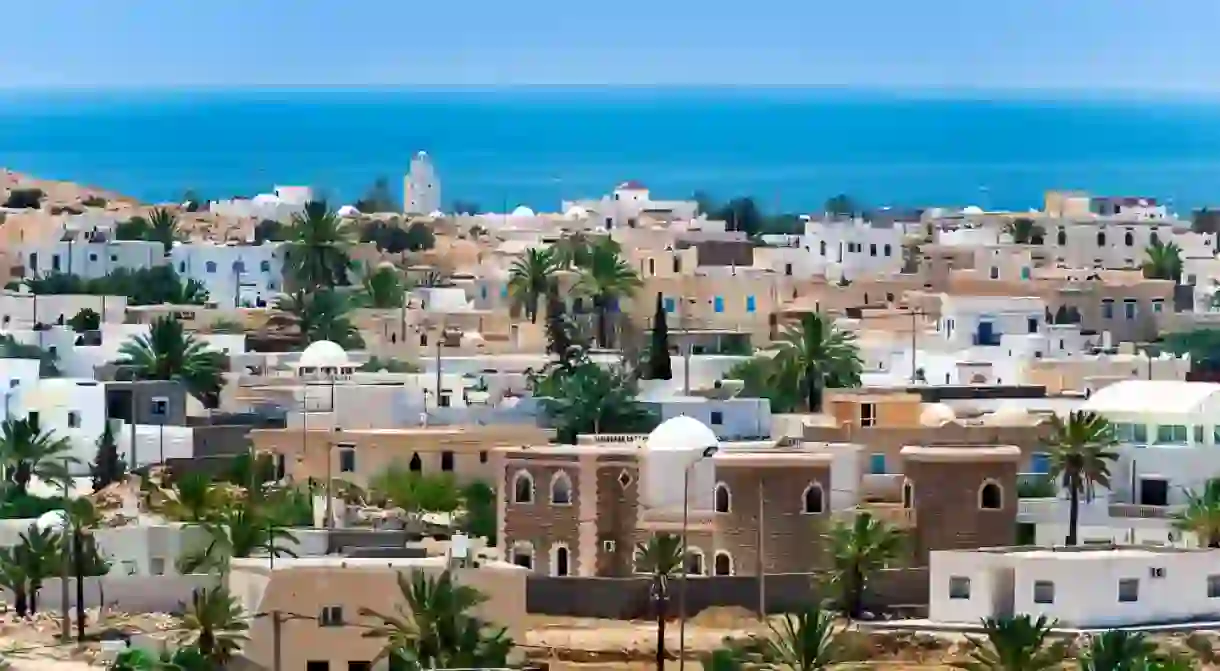Top Things To Do And See In Djerba, Tunisia

If you’re looking for a place that sums up island living, it’s Djerba. Just 5 km of Tunisia’s southern coast, this peninsula’s gently sloping sandy beaches and perfect climate has made it a popular stop for travelers. The idyllic villages and scenery make delving deeper into Tunisian culture and exploring the sightseeing attractions a must. Here we explore the 10 unmissable thins to do in Djerba.
Houmt Souk medina
Historical Landmark

Tunisia | Photo by Chermiti Mohamed on Unsplash
Djerba beach
Historical Landmark

Djerba Beach, Tunisia | Photo by Khalil Yamoun on Unsplash
Ras Rmel (Flamingo Island)
Historical Landmark

Ras Rmel is a peculiar almost surreal scenery. Not really an island but more consisting of enormous wetlands, it is an eco-reserve where thousands of flamingos flock together. The combination of the birds’ neon-pink color and the azure blue of the ocean is magical. From Houmt Souk you can take a boat to the island, snorkel and swim, go for a siesta in the available hammocks or just try the divinely fresh oysters and coquilles caught by the local fishermen.
Watch out for: the dazzling colors of sea and flamingos
Guellala
Historical Landmark

Guellala, Tunisia | Photo by Philippe Leten on Unsplash
El-Ghriba
Historical Landmark

The El-Ghriba synagogue is a fine intermezzo when discovering the village of Er-Riadh, located in central Djerba. It is the most prominent reminder of the island’s vibrant Jewish community, who have lived in Er-Riadh since 586BC, and is still an important place of pilgrimage for Jews from all over the world. Although not very impressive from the outside, El-Ghriba’s interior is a rich mix of blue tiles warmed by sunlight streaming in through colored glass windows. The Torah scrolls kept at this synagogue are among the most important and valuable in the world.
Crocodile Farm
Historical Landmark

Being the largest crocodile farm within the Mediterranean area, you can’t miss out on gawping at larger-than-life crocodiles, especially when having children out on vacation too. Over 400 of these creatures have been imported from the Nile River and Madagascar, and are living in a tropical zoo-like environment beautifully designed with exotic plants, ponds and papyrus trees. Make sure you’re there at feeding time; scary moments and excited kids are assured.
Midoun
Historical Landmark

Midoun is one big market town, Djerba’s largest and famous for its buzzing Friday market. Surrounded by fruit orchards and date-palm groves, Midoun’s medina is made up of skinny alleyways and gorgeous houses with the typical Arabian doors, and lush with flowers hanging from the balconies. The town also has an excellent restaurant scene, with cuisine inspired by a myriad of cultures, including Spanish, French, Moroccan and Sudanese.
Sleep in a traditional Tunisian houch
Historical Landmark
To experience the real Tunisian life, passing the night in a traditional houch is a must. Mostly part of a bigger menzel or shared house, these cave-like rooms are comfortable, charming, and typically Djerbian, and make you feel peaceful and rested immediately. You will find these menzels mostly in the countryside just outside of the cities or towns, surrounded by orchards, olive trees and swaying palm trees. In one word: a dream.
Watch out for: the soothing calm of the houch’s thick walls, patio and environment
Watch the sunset in Borj Djillidj
Historical Landmark

Close to the village of Ajim – where some of Star Wars’ scenes have been shot – is Borj Djillidj, where the most beautiful sunsets can be watched. The quiet little port where traditional fishermen return home after catching octopus and fish is the most quiet and serene place, perfect for observing the beauty of this world.
Watch out for: the pure serenity of a stunning sunset
The International Ulysse Festival of Djerba
Historical Landmark
French and Arabic speaking visitors will have the time of their lives at the Ulysse Festival in Djerba, every year from July till August. Theatre plays, music performances and film screenings in the busy streets and on the cozy squares of Houmt Souk make for a real party atmosphere. Don’t worry if you don’t have that knack for languages; you will feel the vibe and enjoy it nevertheless. Just mix with the crowd and go with the flow.













